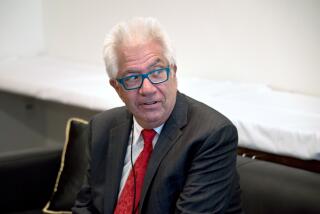U.S. Needs to Stop Lecturing Japan and Make Its Own Luck
- Share via
As news came from Tokyo that Japan’s ruling coalition was breaking apart, imperiling new Prime Minister Tsutomu Hata’s tenure, leading experts on Japan and Asia were meeting in Los Angeles to hear author James Fallows talk about his new book, “Looking at the Sun: The Rise of the New East Asian Economic and Political System.”
Insofar as Japanese politics is concerned, the experts agreed that Hata would be out of office in a matter of weeks, possibly to be replaced by Ochiro Ozawa, the deputy leader but real power in Hata’s Renewal party.
Far more significantly, Japan is changing its electoral system to one of constituencies voting for a single member of Japan’s legislature, similar to congressional elections in the United States. Indeed, Fred Notehelfer, director of UCLA’s Center for Japanese Studies, predicted that after their next election, Japan’s parties would realign philosophically along the lines of U.S. Democrats and Republicans.
But such political change in Japan won’t make it an Asian model of the United States. On the contrary, party realignment will be only one change among many in the next few years, including a move toward Japanese rearmament and defense and foreign policies more independent of the United States.
The implications for global business and for future trade and other relations among the United States, Japan and the rest of Asia are profound.
Independent policies “would make Japan a real country, one that bears responsibility for its own sovereignty and makes its own policies,” Fallows writes. As it is, Japan’s dependence on the United States for military and foreign policy only exacerbates disputes over Japan’s trade surpluses--$141 billion with all the world’s major nations and trading blocs, including roughly a $50-billion surplus with the United States.
But look beyond numbers, says Fallows. A lot more is happening in Asia. His book covers the economies of half a dozen countries from Japan to Thailand, but its real subject, says the author, is the political and historic watershed marking the end not only of the post-World War II period but of centuries of colonial history.
“Throughout the region there is the sense that must have prevailed in much of Europe in the 1800s and the United States through the past century, that economic activity is changing life even as you watch,” he writes.
But Fallows, 44, a Harvard graduate and Rhodes scholar who took a diploma in developmental economics from Oxford, is more sharp-eyed than wide-eyed. He recognizes how closely linked the Asian nations are to Japan, which has become the main source of investment and technology for Southeast Asia. Japanese industry has invested roughly $30 billion in Thailand, Malaysia and Singapore, a total now greater than that of U.S. firms.
Fallows points out how reliant the larger economies of South Korea and Taiwan are on Japanese technology.
And he reports that despite the current recession, Japan’s industry has been investing for the future--a total of $3 trillion in new plants and equipment between 1987 and ’92. Private investment has been augmented by $400 billion a year in public works spending by government.
As a result, writes Fallows, East Asia, centered on the industrial might of Japan, has become the fastest-growing part of the world economy and should remain so “through the 1990s and beyond.”
The region owes a lot to the United States, which last year bought $100 billion more in goods from Asia than it sold in return, and also protected the region with military forces on land and sea.
But Asia is not in a mood for gratitude these days. As Asia’s economies have prospered, and social change has brought pressure on its traditional societies, Asia’s leaders have become resentful of lectures from Washington--about free-market economics or democracy or the punishment of vandals.
Yes, says Fallows, Asian governments may be authoritarian and their trade more statist than free-market. But the way they see it, those policies have brought them prosperity, and U.S. officials are not helping the American cause by finger-wagging lectures.
Fallows’ book has been attacked for saying such things, but it is only reporting what Asian scholars are saying: that the West could learn some values from their societies.
More bluntly, Asians find U.S. protests of Singapore’s caning sentence for an American vandal pathetic when Asian students are shot to death in U.S. streets.
What, then, should be the U.S. approach to this fast-changing world? In effect, “to thine own self be true,” says Fallows, who lived with his family in Asia for more than three years while researching this book. Develop and strengthen the unprecedented values of the American system, which has always welcomed outsiders and encouraged individuals.
Specifically, he writes, fix U.S. education so that “the worst educated” reach a level of competence. The best of U.S. education is better than anything in Asia, including Japan, he says.
In trade, he counsels, don’t lecture Japan--or other countries--about open markets or “fair” trade. Simply demand that they buy U.S. goods, as was done in the U.S.-Japan semiconductor agreement of 1986. If they stall or refuse, cut off their sales to the U.S. market.
And increase incentives for Americans to save, and put the money behind U.S. industry, Fallows recommends.
“The United States should make itself less dependent on Japan” for capital and technology, he writes.
“Japan does not look upon its relationship with the United States as something that inherently is desirable or that should be maintained out of a philosophical commitment to shared ideals,” Fallows says.
So as Japan and Asia change, America needs to change also, to strengthen itself. “Now, as in the past,” Fallows concludes, “economics favors those who are determined to make their own luck.”
More to Read
Sign up for Essential California
The most important California stories and recommendations in your inbox every morning.
You may occasionally receive promotional content from the Los Angeles Times.













